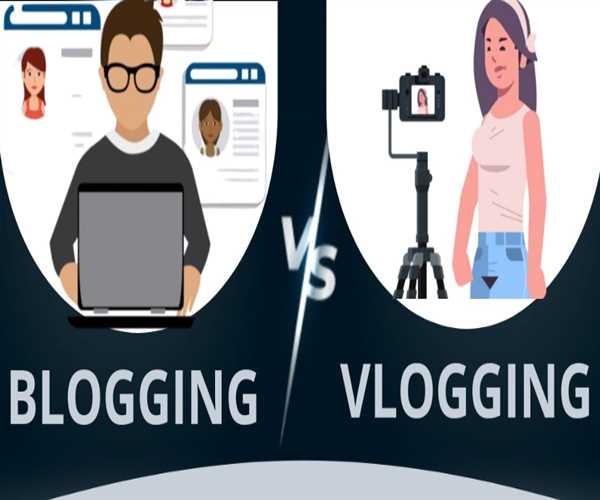In today's digital world, content development is paramount. However, with so many platforms and formats competing for attention, prospective artists frequently face a difficult decision: blog or vlog? While both provide excellent opportunities for expression, recognizing their fundamental distinctions is critical for determining the best match.
This blog goes into ten key differences between blogs and vlogs, providing you with the information you need to navigate the content production environment and develop a successful online presence.

1. Content Format: Text or Video
The key distinction is in the content format itself. Blogs are generally text-based, allowing authors to communicate information, thoughts, and tales through written words. They can be supplemented by photographs, infographics, and even integrated videos, but the focus stays on written material.
Vlogs are video blogs. Creators utilize video as their primary medium, relying on images, sound, and editing skills to interest viewers. Vlogs may take many forms, from educational instructions to personal narratives, all presented via video recordings.
2. Production Requirements:
Blogs and vlogs have unique production needs. Setting up a blog normally entails selecting a blogging platform, constructing a website (optional), and creating engaging written material. While cosmetic components can improve a blog, the technological barrier to entry is minimal.
Vlogs take significantly more production work. Equipment like cameras, microphones, and editing software may be required. Scriptwriting, filming, and editing all contribute to the vlog creation process, which necessitates a greater degree of technical knowledge and time commitment.
3. Consumption Style:
Blogs target a passive consumption style. Readers can go at their own pace, revisiting portions for clarification or skimming stuff that does not interest them. Blogs are good for detailed discussions, complicated topics, and instances when visual aids are not required.
Vlogs provide a more engaged consumer experience. Viewers rely on the creator's voice, graphics, and editing to process information. Vlogs are particularly effective for engaging viewers with demonstrations, showcasing personalities, and conveying emotions that would be difficult to express through words.
4. Content Length:
Blog postings can range in length, from little tidbits to lengthy essays. Shorter blog entries may focus on fast suggestions or news updates, but lengthier ones might dig into difficult issues or narrative.
Vlogs often have a more specified length range. While there are exceptions, vlogs are typically between 5 and 20 minutes long, catering to shorter attention spans and on-the-go video viewing.
5. Audience Reach and Engagement:
Blogs and vlogs may reach a large audience with effective content and distribution tactics. Bloggers may use SEO (Search Engine Optimization) tactics to reach a larger readership via search engines. Additionally, social media advertising can increase visitors to a site.
Vloggers generally rely on social media sites such as YouTube, Instagram, and TikTok to reach their audience. The engaging quality of video content may result in viral moments and quick audience development. However, competition for video outlets may be strong.
6. Monetization Strategies:
Blogs and vlogs provide options for monetization. Popular blogging choices include showing targeted adverts, providing sponsored content for companies, and selling digital things such as books or courses.
Vlogs may benefit from similar monetization tactics as adverts and sponsored content. Additionally, producers may collaborate with businesses for product placement or include affiliate marketing connections. Building a devoted following on sites like YouTube may lead to extra revenue sources via features such as channel subscriptions and item sales.
7. Abilities and Personality:
Each format requires a unique set of abilities and personality traits. Blog writing necessitates excellent writing skills, research ability, and an awareness of SEO. Furthermore, a blogger does not have to be comfortable being "on camera."
Vlogging necessitates a relaxed on-camera presence, engaging narrative ability, and fundamental video editing capabilities. While writing skills might be useful for scripting or video descriptions, the goal is to captivate people through video.
8. Learning Curve:
The learning curve for each format differs. Writing interesting blog entries needs practice and awareness of fundamental SEO techniques. However, the technical barrier to entrance is rather low.
Vlogging necessitates learning video editing software, becoming a comfortable on-camera presence, and maybe investing in equipment. The learning curve might be higher, necessitating commitment and an openness to experimentation.
9. Scalability and sustainability:
Blogs have good scalability. Once published, information remains available permanently, perhaps drawing new readers organically via search engines. To keep an audience engaged, blogs may demand continuous content generation.
Vlogs may also be scaled, with successful videos attracting more viewers over time. However, the fleeting nature of online trends needs regular vlog production to keep viewers interested.
10. Selecting the Right Format:
The decision between blogging and vlogging is ultimately based on your personal abilities, interests, and aspirations.
Do you love writing and researching, or do you prefer to communicate yourself through video? Consider your present talents and desire to acquire new things.
Is your information best suited for text-based explanations, or would it benefit from visual demonstrations? Analyze the nature of your material to decide the best format.




Leave Comment